
Roman Lawyer, Politician, Statesman, and Philosopher
106 - 43 BCE

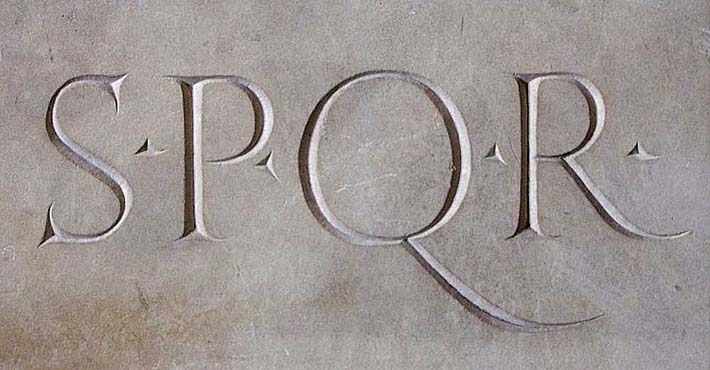
Marcus Tullius Cicero (106-43 BC) was Rome's greatest orator and a prolific writer of verse, letters, and works on philosophy, politics, and rhetoric that greatly influenced European thought.
Cicero was born on Jan. 3, 106 BC, at Arpinum near Rome, the elder son of a wealthy landowner. At an early age Cicero saw military service during the Social War (91-88), but he managed to avoid involvement in the civil wars that followed. He wanted to follow a career in politics and decided first to gain a reputation as an advocate.
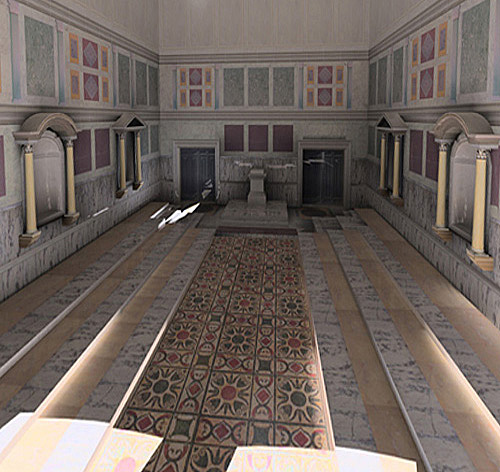
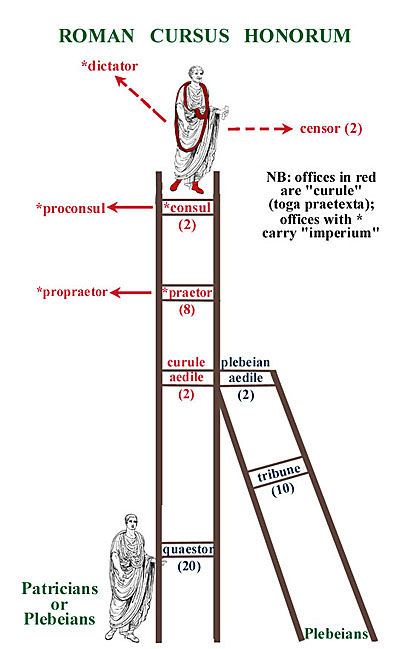
Cicero's first appearances in court were made during the dictatorship of Sulla (81-80). In one case, while defending Sextus Roscius of Ameria on a trumped-up charge of murder, he boldly made some outspoken comments on certain aspects of Sulla's regime, and in 79 he left Rome to study in Rhodes. By 76 Cicero was back in Rome, where he married Terentia, whose family was wealthy and perhaps aristocratic. In 75 he held the office of quaestor, which brought him membership in the Senate, and in 70 he scored his first great success, when he prosecuted Caius Verres for gross misgovernment in Sicily. As Verres was defended by the leading advocate of the day, Quintus Hortensius, Cicero's success in this case won him great acclaim and considerably helped his political career.
In 69 Cicero held the office of aedile and that of praetor in 66, in which year he made his first major political speech in support of the extension of Pompey's command in the Mediterranean. During the following years he acted as a self-appointed defender of that general's interests. When Cicero stood for the consulship of 63, he reached the highest political office at the earliest legal age, a remarkable achievement for a complete outsider. His consulship involved him in a number of political problems which culminated in the Conspiracy of Catiline.
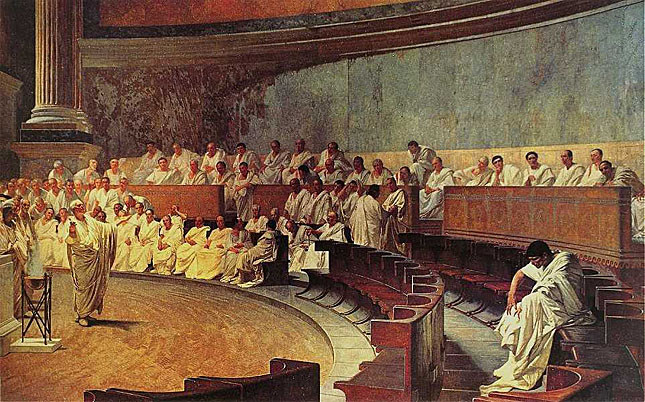
In the years after his consulship Cicero, politically helpless, watched Caesar, Pompey, and Crassus form the dictatorial First Triumvirate. Cicero refused offers to become a fourth member of this alliance, and his publicly expressed dislike of the violent methods Caesar employed in his consulship (59) led to Cicero's Exile to Macedonia. There he lived for 16 months in abject misery, until the efforts of his friends secured his recall in August 57 B.C.
During the next 8 months Cicero tried to separate Pompey from his partners, but early in the summer of 56 Pompey brusquely ordered Cicero to stop his efforts. For the next 4 years he was largely out of politics, devoting himself to writing and occasionally emerging to defend (inconsistent behavior on his part) various supporters of the Triumvirate.
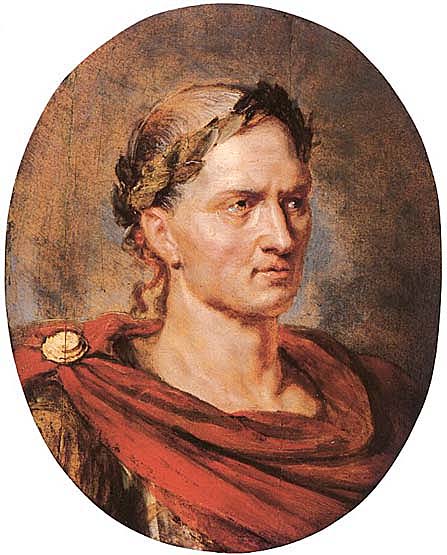
In 51 Cicero was sent off to govern Cilicia for a year. He was a conscientious and unusually honest administrator, but he was bored by the whole business and hated every moment of his absence from Rome. He finally returned in December 50 B.C., too late to be able to do anything to stop the outbreak of War between Pompey and Caesar. He accepted a commission from Pompey but did little for him, and when Pompey left Italy, Cicero stayed behind.
After Pompey's Death Cicero took no part in politics and devoted himself to writing works on philosophy and rhetoric. Apart from his increasing dislike of Caesar's autocratic rule, Cicero's life was made unhappy during these years by domestic sorrows. In the winter of 47/46 he divorced Terentia after 30 years' marriage, and in the following summer he was deeply grieved by the death of his much-loved daughter Tullia.
Cicero was not involved in the conspiracy against Caesar, though he strongly approved of it, and after the assassination he took a prominent part in establishing a compromise between Antony and the conspirators. But before long he concluded that Antony was as great a menace to liberty as Caesar had been. During the winter of 44/43 with a series of vigorous speeches, the "Philippics," he rallied the Senate to oppose Antony in concert with Octavian. But Octavian, having seized power at Rome by force, reached an agreement with Antony and Lepidus to set themselves up as a three-man dictatorship. They started by proscribing many of their enemies, and among the irst names on the list was that of Cicero. He could perhaps have escaped, but his efforts were halfhearted, and in December 43 B.C.
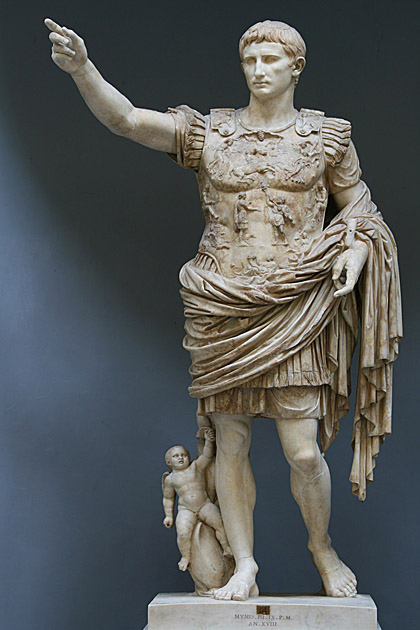
He met his death at the hands of Antony's agents with courage and dignity.
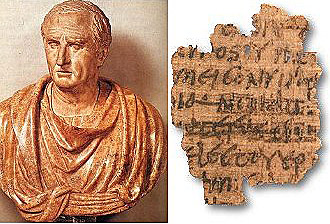
As a politician, Cicero was ultimately unsuccessful, since he was not able to prevent the overthrow of the republican system of government. Devoted to peace and reason, he lived in an age when political power depended more and more on sheer force. Moreover, he was blind to many of the defects of the republican system and did not realize how much it failed to meet the real needs of the provincials and even of the poorer citizens of Italy and Rome itself.
The Speeches
The texts of 57 speeches have survived, though 2 or 3 are not complete, and Cicero delivered at least 50 more, nearly all of which were published but have since been lost. As Cicero normally edited and polished his speeches before publication, we do not have the text of what he actually said, but in most cases a more or less close approximation.
However, five speeches against Verres were never delivered but were written by Cicero to present material not used in court; the "Second Philippic" is a political pamphlet cast in the form of an imaginary speech; and Pro Milone represents what Cicero would have said in Milo's defense in 52 if he had not been flustered by a hostile mob into making a poor and ineffective speech.
The corpus of the extant speeches is impressive both for its bulk and its quality. It is hard not to be impressed by their vigor, by their variety of tone, and above all by the lucidity with which Cicero could present a complicated series of facts. Of the forensic speeches, Pro Cluentio (66) is the longest and most complicated, but it gives a vivid picture of life in a small Italian town. The much shorter Pro Archia (62) is notable for its sincere and eloquent defense of a life devoted to literary pursuits, and Pro Murena (63) is an excellent example of Cicero's ability to win a case by disregarding the basic facts and concentrating with charm and wit on such irrelevancies as the Stoic beliefs of one of the prosecutors. Of the political speeches, although the "Catilinarians" are the most famous, the 14 "Philippics" are probably the finest, because in them Cicero was concentrating all his energy and skill with a directness that he did not always achieve.
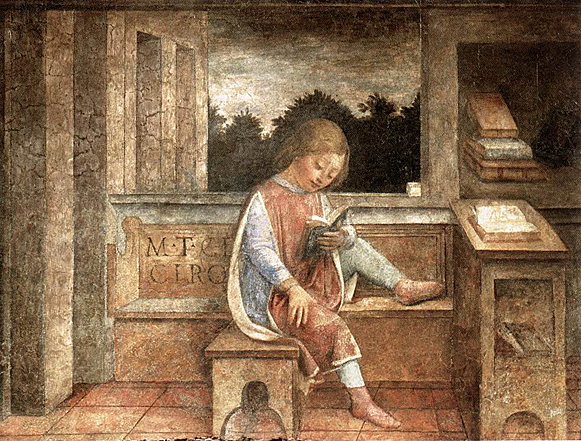
The Dialogues
Nearly all of Cicero's works on philosophy, politics, or rhetoric are in dialogue form, though Cicero had little of Plato's dramatic instinct for the genre. They are written in that elegant and sonorous Latin prose of which Cicero was such a master. Several are devoted to ethics, religion, or other philosophical subjects, but they cannot be regarded as original contributions to philosophy, for Cicero himself acknowledged, "I provide only the words, of which I have a very large stock." Nevertheless, they are extremely valuable because in them he reproduced the theories of many of the leading Greek philosophers of the post-Aristotelian schools, such as the Stoics and the Epicureans, whose own works have not survived.
Among the more attractive are the short essays on friendship and old age, De Amicitia and De Senectute (both 44). Of the longer works, the most important are probably De Finibus (45), a systematic discussion of ethics; De Natura Deorum (45), a hastily written and disjointed but valuable survey of contemporary religious beliefs; and De Officiis (winter 44/43), a treatise on moral duties.
Another group is concerned with political theory, especially De Republica (54-51), of which barely one-third is extant, and De Legibus, started in 52 but perhaps never completed. These works also are to some extent based on Greek ideas, but the theoretical basis is reinforced by the Roman practical genius for the art of government and Cicero's own considerable experience of politics.
In the works on Cicero's own art of rhetoric there is a similar blend of Greek theory and Roman practical experience. The most important are De Oratore (55), which is basically a discussion of the training of the ideal orator but takes in many aspects of the art of speaking, such as humor; Brutus (45), which contains an account of Roman oratory of great historical importance, with sketches of nearly 200 speakers; and Orator (45), in which Cicero discusses the different styles of oratory and various technical aspects of rhetoric, including a detailed examination of prose rhythms.
The Poetry
In his youth Cicero wrote a quantity of verse, none of which has survived, and he won a considerable reputation as a poet. In later years he composed a short epic on the great soldier Marius and a longer poem on his own consulship. Of such poetry, only a few scattered lines have been preserved, in one or two cases because they are so very bad. We do have, however, several hundred lines of the Aratea, a translation of a poem on astronomy by the Alexandrian poet Aratus, and a number of shorter passages also translated from Greek originals. It is clear that Cicero had little real poetic inspiration but was a highly competent craftsman who did much for the development of the dactylic hexameter in Latin, and metrical analysis suggests that in this respect Virgil owed as much to him as to any other poet.
The Letters
The collection of Cicero's letters is undoubtedly the most interesting and valuable part of all his enormous literary output. It includes nearly 800 letters written by him, and nearly another 100 written to him by a wide variety of correspondents. The two major collections are the letters Ad Atticum in 16 books, and Ad Familiares, also in 16 books, published by his freedman secretary Tiro. This latter set includes practically all the letters written to Cicero. There are also two smaller sets, three books of Ad Quintum Fratrem and two books of Ad M. Brutum, both the remains of what were at one time larger collections. Other sets of letters to his son Marcus, to Julius Caesar, to Octavian, and to others have all been lost. The surviving letters belong mainly to his last years; there are only 12 dating before his consulship, while over a quarter of the collection were written in the last 18 months of his life.
Some of the letters are as carefully composed as the speeches or dialogues, but most of them, especially those to his brother or to close friends like Atticus, have a spontaneity which is often lacking in the more calculated prose. In these intimate letters Cicero uses a very colloquial style, with frequent use of slang, ellipse, diminutive forms, and words or phrases in Greek.
But however rapidly they may have been written, Cicero never loses his instinctive sense of style, and their combination of immediacy with stylishness makes them some of the most attractive reading in the whole of Latin literature, quite apart from the fascination of their subject matter, for they cover an immense range of topics. But above all, they give an incredibly vivid picture of Cicero himself: his vanity, his facile optimism and equally exaggerated despair, his timidity and his indecisiveness, but also his energy and industry, his courage, his loyalty, and his basic honesty, kindliness and humanity. Thanks to his letters, we can know Cicero as we know no other Roman, and with all his faults he was a man worth knowing.
There could be some duplication in this section (Seleta Opera Ciceronis) with other material that I have already posted on the page about the life and work of Cicero. The redundancy where it does occur, I hope, will only broaden your understanding and appreciation of this man. It is an opportunity to read Cicero (in translation) and view him through his own words.
~ Senex Magister
Selecta Opera Ciceronis
On Old Age
The Orations Against Marcus Antonius by Marcus Tullius Cicero
The Phillipics
Return to Persona Historiae
Return to Pagina Artis
Return to Bruce and Bobbie's Main Page.